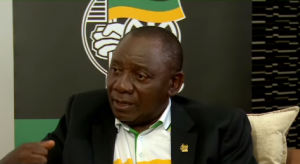
JOHANNESBURG, South Africa. The South African government has deployed the army to volatile hotspots in Johannesburg and Durban after a wave of xenophobic violence killed at least seven people, displaced more than 5,000 and plunged the country into a diplomatic crisis.
Officials described military intervention as a last resort that would act as a deterrent, but an opposition party described it as an over-reaction reminiscent of the racist apartheid regime.
Nosiviwe Mapisa-Nqakula, the defence minister, said troops would be deployed to volatile areas in the two cities, where migrants from Zimbabwe, Malawi,Mozambique and other African countries had been targeted over the past three weeks.
“We come in as the last resort – the army will serve as a deterrent,” said Mapisa-Nqakula, declining to specify how many soldiers would be involved.
“There are people who will be critical, but those who are vulnerable will appreciate this decision. Now we are deploying because there is an emergency.”
She admitted: “There will be those who will be critical of this decision but the vulnerable will appreciate it.”
One of the areas in question is Johannesburg’s Alexandra township, where tightly crammed shacks sit under corrugated tin roofs and discarded trash is a breeding ground for rats, a jarring contrast from the looming skyscrapers of wealthy Sandton.
On Saturday a Mozambican man, Emmanuel Sithole, was stabbed to death in the township in broad daylight and on Monday night a Zimbabwean husband and wife were both shot in their necks but survived, Mapisa-Nqakula said.
By Tuesday the mood was generally calm. Tebogo Ramabulana, a cultural project manager, said: “Street vendors from other countries are here. Somalis are opening shops and making things easier for elderly people who can’t go to the mall. I wanted to take pictures today to show the world these people are still working and there is no violence.”
Yet he welcomed the military. “The attacks mostly come at night from the guys in the hostels. It’s criminals, not the community. Sending in the army is a good idea because it’ll cool down those guys so they don’t make stupid moves.”
The xenophobic outbreak is the worst since 2008, when 62 people were killed in Alexandra and other Johannesburg townships. The army was deployed to restore order on that occasion, and has also been used against striking workers in 2012 and last year.
Another Alexandra resident, gymnastics coach Glen Hlongwane, said: “In 2008 it was hectic, but this time it was quiet until the Mozambican guy was killed. I don’t know what’s next. Maybe that’s why they sent in the army because when something happens in Alex, it really happens. The army will cool things down because people are really scared of them.”
Marc Gbaffou, chairman of the African Diaspora Forum agreed: “Instead of sending the army to the border, send them here because that’s where the killing is continuing. We cannot wait.”
Yet the decision to put soldiers on the streets came after two nights of relative quiet. Police said Durban and surrounding townships had been calm and stable since the weekend and repeated calls for the public not to spread false information on social media.
Julius Malema, president of the opposition Economic Freedom Fighters (EFF) party, rejected the government’s decision. “In Alexandra, one person was killed in what was evidently a criminal act, yet the state decides to over-react with deployment of the military, meaning that soldiers, who are supposed to safeguard the country against external threats are taken into the township to fight crime,” he said.
The EFF staged a march against xenophobia in Alexandra on Tuesday during which gunshots were fired. But Malema continued: “It is clear that the ANC government is losing control over society and now resorting to extreme measures in the same manner done by the apartheid regime. The crisis that confronts society is primarily a political crisis born of politicians who have failed to provide jobs for the people of South Africa, and who have failed to educate the nation on coexistence of all Africans, including socio-economic migrants.”
Zulu king Goodwill Zwelithini has denied triggering the wave of xenophobia in aspeech last month when he called for foreign nationals to leave. Regional relations have been strained, with Zimbabwe, Malawi and Mozambique organising for some citizens to return home. Nearly 400 Malawians arrived overnight in the city of Blantyre, where they were met by government ministers and officials.
Holding her one-year-old daughter in her arms, Agnes Salanje said she faced death from attackers.
“We could have been killed as these South Africans hunted for foreigners, going from door to door,” Salanje, who was a domestic worker in Durban, told Agence France-Presse. “I will not go back. It is better to be poor than be hunted like dogs because you are a foreigner.”
Credit: Guardian (UK)




